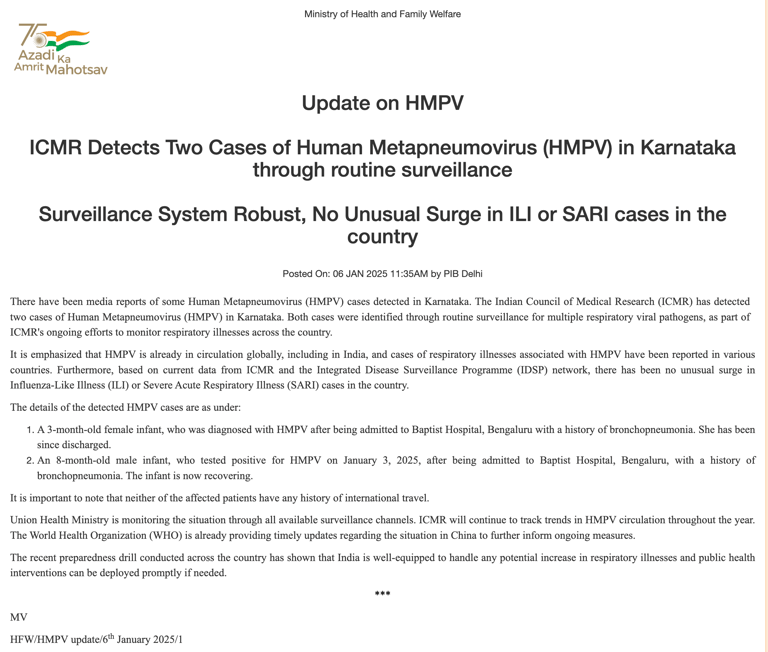HMPV Alarming Cases in Bengaluru Infants
The recent detection of Human Metapneumovirus (HMPV) cases in Bengaluru, India, has raised concerns about a potential new threat to public health.
EDUCATION


The recent detection of Human Metapneumovirus (HMPV) cases in Bengaluru, India, has raised concerns about a potential new threat to public health. HMPV, a respiratory virus with flu-like symptoms similar to COVID-19, is making headlines globally, particularly due to its seasonal outbreaks in China. Unlike COVID-19, which has a higher transmission rate and a broader impact on multiple organs, HMPV is primarily confined to respiratory tract infections and does not spread as rapidly. Here's everything you need to know about this virus, its symptoms, precautions, and the current situation in India.
What is HMPV Virus?
Human Metapneumovirus (HMPV) is a respiratory virus that affects individuals across all age groups. Discovered in 2001, it is a part of the Pneumoviridae family and is closely related to the Respiratory Syncytial Virus (RSV). HMPV is known to cause both upper and lower respiratory tract infections, with symptoms ranging from mild flu-like illnesses to severe conditions such as pneumonia and bronchitis.
Symptoms of HMPV Virus
The symptoms of HMPV resemble those of common respiratory illnesses and usually appear three to ten days after exposure. These include:
Cough
Fever
Nasal congestion
Sore throat
Shortness of breath
Blocked or runny nose
Breathing difficulties
In severe cases, especially in young children, the elderly, and individuals with weakened immune systems, complications such as pneumonia and bronchitis may develop.
HMPV in India: Latest Updates
On January 6, 2025, two cases of Human Metapneumovirus were reported in Bengaluru, marking the first confirmed cases in India. The Karnataka Health Department has confirmed the detection of the virus in an eight-month-old child and another three-month-old infant, both of whom had no history of international travel. While one child has been discharged, the other is receiving treatment at a private hospital in Bengaluru.
The Union Health Ministry has taken note of these cases and is closely monitoring the situation. Hospitals have been advised to follow strict isolation protocols and ensure proper documentation of Severe Acute Respiratory Infections (SARI) cases.
Is HMPV a New Virus?
HMPV is not a new virus; it was first identified in the Netherlands in 2001. However, its recent outbreaks, particularly in China, have caused global concern. Experts note that respiratory illnesses due to viruses like Influenza, RSV, and HMPV are common during flu seasons. Nevertheless, the detection of HMPV in India marks a significant public health event.
HMPV in China: A Global Concern
China has reported a surge in respiratory illnesses, including cases caused by HMPV. Viral videos from hospitals show overcrowded facilities and stressed healthcare workers, raising alarms about the virus's impact. While the outbreak aligns with seasonal variations, the global health community, including the World Health Organization (WHO), is monitoring the situation closely.
Precautionary Measures Against HMPV
Although there is currently no specific antiviral treatment or vaccine for HMPV, the following precautions can help prevent its spread:
Hand Hygiene: Wash your hands with soap and water for at least 20 seconds.
Respiratory Etiquette: Cover your mouth and nose with a handkerchief or tissue while coughing or sneezing.
Avoid Close Contact: Stay away from individuals exhibiting symptoms of respiratory illnesses.
Use Masks: Wear masks in crowded places or if you have symptoms.
Disinfection: Regularly disinfect frequently touched surfaces.
Self-Isolation: Stay home if you are unwell to avoid spreading the virus.
FAQs on HMPV Virus
Is HMPV Virus Deadly?
HMPV can cause severe illness in vulnerable groups such as young children, the elderly, and people with weakened immune systems. However, for most individuals, it presents as a mild respiratory illness.
What is the Mortality Rate of HMPV?
The mortality rate of HMPV is generally low. Severe cases may require hospitalization, but fatal outcomes are rare with timely medical care.
How is HMPV Diagnosed?
HMPV is diagnosed through laboratory tests, including RT-PCR and antigen detection assays, which identify the presence of the virus in respiratory samples.
Is There a Vaccine for HMPV?
Currently, there is no vaccine for HMPV. Research is ongoing to develop effective treatments and preventive measures.
How Does HMPV Spread?
HMPV spreads through respiratory droplets when an infected person coughs or sneezes. It can also spread through direct contact with contaminated surfaces or personal contact with an infected individual.
What Should Parents of Young Children Know?
Parents should monitor their children for symptoms such as persistent cough, difficulty breathing, or high fever. If these symptoms appear, seek medical attention promptly.
What is the Indian Government Doing?
Source:- Ministry of Health and Family Welfare
The Indian government has enhanced surveillance and laboratory testing capabilities to monitor HMPV cases. Hospitals are being equipped with necessary resources, and health advisories have been issued to the public.
The Role of the Indian Council of Medical Research (ICMR)
The ICMR is actively monitoring HMPV trends and ensuring the availability of testing facilities across the country. It is also collaborating with international organizations for real-time updates on the virus's global spread.
Advisory for the Public
Dos:
Wash hands frequently.
Use a mask if you have respiratory symptoms.
Maintain social distancing in crowded areas.
Stay hydrated and maintain a healthy diet.
Don'ts:
Avoid sending children with symptoms to school.
Do not ignore prolonged respiratory issues; seek medical advice.
Avoid touching your face with unwashed hands.
Conclusion
The emergence of Human Metapneumovirus in India highlights the need for vigilance and proactive measures to curb its spread. While the situation is under control, adherence to hygiene practices and timely medical interventions can help minimize the impact of HMPV. Stay informed, follow health advisories, and prioritize your well-being during this flu season.


